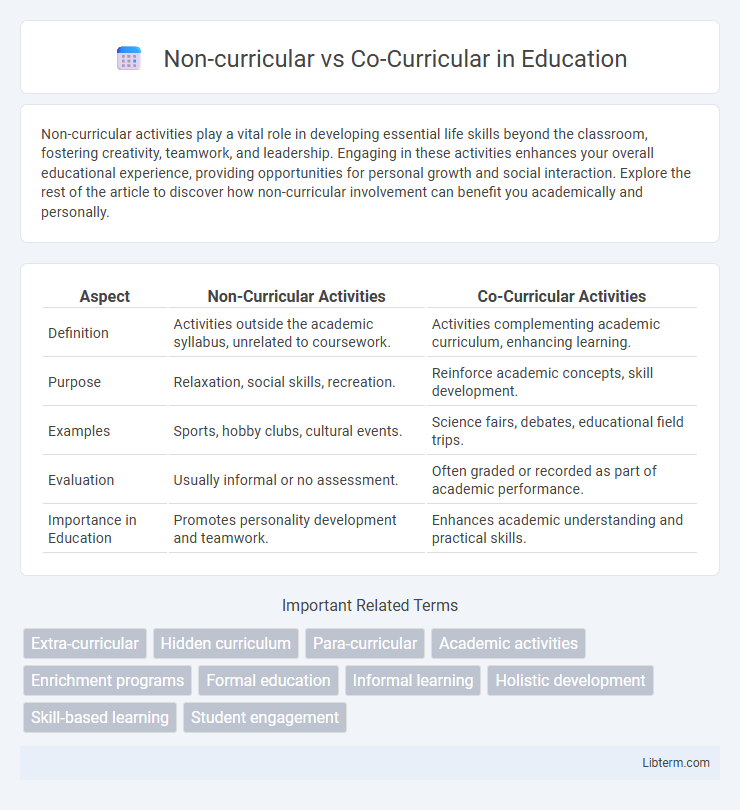Non-curricular activities play a vital role in developing essential life skills beyond the classroom, fostering creativity, teamwork, and leadership. Engaging in these activities enhances your overall educational experience, providing opportunities for personal growth and social interaction. Explore the rest of the article to discover how non-curricular involvement can benefit you academically and personally.
Table of Comparison
| Aspect | Non-Curricular Activities | Co-Curricular Activities |
|---|---|---|
| Definition | Activities outside the academic syllabus, unrelated to coursework. | Activities complementing academic curriculum, enhancing learning. |
| Purpose | Relaxation, social skills, recreation. | Reinforce academic concepts, skill development. |
| Examples | Sports, hobby clubs, cultural events. | Science fairs, debates, educational field trips. |
| Evaluation | Usually informal or no assessment. | Often graded or recorded as part of academic performance. |
| Importance in Education | Promotes personality development and teamwork. | Enhances academic understanding and practical skills. |
Defining Non-Curricular and Co-Curricular Activities
Non-curricular activities are pursuits outside the formal academic curriculum that primarily focus on personal interests or leisure, such as hobbies, volunteering, or sports clubs. Co-curricular activities complement the academic syllabus by integrating learning objectives with practical experiences, including debate teams, science fairs, and student government. Both types of activities contribute to holistic student development but differ in their direct connection to the educational curriculum.
Historical Evolution of Non-Curricular and Co-Curricular Concepts
Non-curricular and co-curricular activities have evolved from distinct educational traditions, with non-curricular activities originally emerging as informal pursuits outside formal education systems to foster personal interests and social skills. Co-curricular activities developed to complement academic curricula by integrating practical experiences that support cognitive and social development, gaining prominence during the progressive education reform movements of the late 19th and early 20th centuries. The historical evolution reflects a shift from viewing extracurricular engagements as mere leisure to recognizing their essential role in holistic student development within structured educational frameworks.
Key Differences Between Non-Curricular and Co-Curricular Activities
Non-curricular activities consist of extracurricular pursuits unrelated to the academic curriculum, such as clubs, sports, and volunteering, while co-curricular activities complement and reinforce classroom learning through related projects, competitions, and workshops. Non-curricular activities primarily aim to develop social, leadership, and personal skills, whereas co-curricular activities enhance academic understanding and subject-specific competencies. The integration of co-curricular activities directly supports educational objectives, whereas non-curricular activities foster broader holistic development outside formal academics.
Educational Value of Co-Curricular Involvement
Co-curricular activities complement academic curriculum by enhancing critical thinking, teamwork, and leadership skills, which are vital for holistic student development. Research from the National Education Association highlights that students engaged in co-curricular programs exhibit higher academic achievement and improved social adaptability compared to those involved only in non-curricular pursuits. These activities create experiential learning opportunities that foster personal growth and career readiness, underscoring their substantial educational value beyond traditional classroom instruction.
Role of Non-Curricular Activities in Personal Development
Non-curricular activities play a crucial role in personal development by fostering essential life skills such as leadership, communication, and time management beyond the academic curriculum. These activities, including clubs, sports, and volunteering, enhance emotional intelligence and social adaptability, preparing individuals for real-world challenges. Unlike co-curricular activities, which complement academic learning, non-curricular pursuits offer broader opportunities for self-discovery and holistic growth.
Impact on Academic Performance and Student Engagement
Non-curricular activities, such as sports and clubs, enhance student engagement by fostering social skills and stress relief, which indirectly support better academic performance. Co-curricular activities, integrated with the curriculum like science fairs or debates, reinforce subject knowledge and critical thinking, leading to improved grades and deeper understanding. Research indicates that balanced participation in both non-curricular and co-curricular activities correlates with higher academic achievement and increased motivation in students.
Examples of Co-Curricular vs Non-Curricular Activities
Co-curricular activities complement the academic curriculum by enhancing skills and knowledge, examples include debate clubs, science fairs, and music bands, which reinforce classroom learning. Non-curricular activities are pursued outside the academic scope for personal growth or recreation, such as sports leagues, community service, and hobbies like painting. The distinction lies in co-curricular activities being integrally linked to educational objectives while non-curricular activities prioritize extracurricular enjoyment and personal interests.
Institutional Approaches to Activity Integration
Institutions adopt structured frameworks to integrate co-curricular activities by aligning them with academic goals, enhancing student engagement and skill development beyond classroom learning. Non-curricular activities are often treated as informal or extracurricular, lacking direct linkage to academic evaluation or credit, which can limit their perceived educational value. Effective institutional approaches emphasize embedding co-curricular experiences within the curriculum framework, ensuring measurable outcomes and fostering holistic student development.
Challenges in Balancing Academic and Extracurricular Participation
Balancing academic demands with non-curricular activities presents challenges such as time management conflicts and increased stress levels, which can impact overall student performance. Co-curricular participation, while integrated with academic goals, often requires careful scheduling to avoid overburdening students and ensuring meaningful engagement. Prioritizing tasks and setting boundaries between study commitments and extracurricular involvement are essential strategies to maintain academic success and personal development.
Future Trends in Non-Curricular and Co-Curricular Education
Future trends in non-curricular and co-curricular education emphasize personalized learning experiences leveraging AI-driven platforms to enhance skill development beyond traditional academics. Integration of virtual reality (VR) and augmented reality (AR) technologies enables immersive and interactive environments for both non-curricular activities like arts and sports, and co-curricular programs aligned with curricular goals. Data analytics and wearable tech provide real-time feedback, fostering continuous improvement and engagement in diverse extracurricular domains.
Non-curricular Infographic

 libterm.com
libterm.com